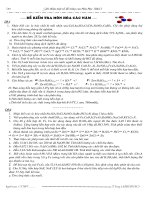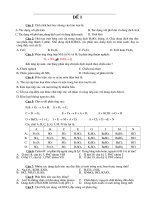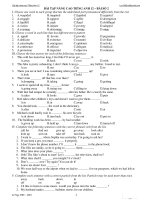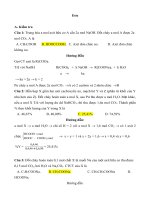BÀI TẬP NÂNG CAO LỚP 12 pot
Bạn đang xem bản rút gọn của tài liệu. Xem và tải ngay bản đầy đủ của tài liệu tại đây (64.99 KB, 4 trang )
BÀI TẬP NÂNG CAO LỚP 12
I. Choose the most suitable option to complete the sentence:
1. Mrs.Edward is at the market. Right now she (look) ……… at the apples. They (look)……… fresh.
a. look / look b. has been looking / looked c. is looking / are looking d. is looking/ look
2. I cannot forgive ……… myseft ……… not seeing Tom before he left……… Japan.
a. to / for / 0 b. 0 / for / for c. with / to / to d. at / about / 0
3. Look! The bus ……… .
a. leaves b. is leaving c. left d. had left
4. “Would you mind if I smoke?” – “ ……… ”.
a. Never mind b. Yes, please don’t c. Not at all d. Yes, please do
5. Don’t worry. By the time we ……… cooking, they……… their homework.
a. finished / will have done b. have finished/will have done c.finish/will be doing d. are finished/will do
6. Who is responsible for mowing the ……… ?
a. grass b. garden c. lawn d. trees
7. We are having a ……… party next week. Would you like to join us?
a. house moving b. housewarming c. homecoming d. new housing
8. ……… economics is the study of ……… management.
a. House/home b. Home/house c. Home/household d. Housing/homehold
9. She apologized ……… me ……… her lateness.
a. 0/ about b. with / of c. to / for d. 0 / for
10. It is essential that household chores should be divied ……… family members.
a. among b. up among c. into d. for
11. When their first child ……… , they ……… married for three years.
a. had been born/were b.was born/had been c. was born/were d. had been born/had been
12. This story reminds me ……… anovel……… Mark Twain.
a. of / of b. about / by c. of /by d. about / of
13. He isn’t independent ……… any means. He depends……… his father……… everything.
a. by / on / out b.for / on / at c. of / in / for d. on / in / with
14. “Shall we start now?” – “…………”
a. Yes, we are b. Yes, let’s c. Of course not d. No, no
15. “Don’t forget to come to my party tomorrow.” – “…………”
a. I don’t b. I won’t c. I can’t d. I haven’t
16. The local authorities all agreed to close some……… factories.
a. economic b. uneconomic c. economical d. uneconomical
17. I am well……… with the problems encountered in strarting a business.
a. aware b. informed c. acquainted d. knowledgeable
18. It would be best to have a ……… friend to ……… .
a. close / share secrets b. nearby / tell stories c. best / chat d. close / confide in
19. The people next door are furious ……… us……… making so much noise last night.
a. at / with b. with / for c. for / to d. about / in
20. he may be quick ……… understanding but he isn’t capable……… remembering anything.
a. in / of b. on / at c. at / of d. of / at
21. I often get up early.
a. I am used to get up early b. I can get up early
c. I am used to getting up early d. I like to get up early
22. It’s ages since I last saw a Hollywood film.
a. I haven’t seen any Hollywood film before. b. I haven’t seen a Hollywood film for a long time.
c. I saw a last Hollywood film since ages ago d. It’s ages because I last saw a Hollywood film.
23. Getting a good job doesn’t interest him.
a. He is only interested in getting a good job b. He isn’t good at getting a good job.
c. He isn’t interested in getting a good job d. Even a good job isn’t suitable to him.
24. “Don’t be so disappointed, Bill. You can take the driving test again,”said helen.
a. Helen told Bill to be disappointed in order to take the driving test again.
b. Helen said Bill not to be disappointed because of the driving test again.
c. Helen told Bill not to be disappointed and not to take the driving test again.
d. Helen encouraged Bill to take the driving test again.
25. “No, I didn’t steal anything from her,” said Tom.
a. Henry confirmed that he had stolen things from her. b. Henry refused to steal things from her.
c. Henry denied stealing things from her d. Henry said no to stealing things from her.
26. “I’ll certainly help you tomorrow,” said Martin to Mary.
a. Martin told Mary to help him the day after b. Martin asked if Mary wanted him to help her the day after
c. Martin promised to help Mary the day after d. Martin announced that he would help mary the day after
27. “You’re always making terrible mistakes,” said the teacher.
a. The teacher complained about his students making terrible mistakes.
b. The teacher asked his students always made terrible mistakes.
c. The teacher realized that his students always made terrible mistakes.
d. The teacher made his students not always make terrible mistakes.
28. “Shall I help you clear the table?” Ann said to the hostess.
a. Ann suggested to the hostess to clear the table b. Ann offered to help the hostess to clear the table.
c. Ann asked the hostess if she wanted to clear the table. d. Ann asked the hostess to clear the table.
29. Direct speech: “ I must have my suit cleaned now.”
Indirect speech: ……………………………………….
a. He said that he had to have his suit cleaned then. b. He said that he must have had his suit cleaned then.
c. He said he must have his suit cleaned then. d. He asked that he had to have his suit cleaned then.
30. Direct speech: “ Can I see your ticket, please?”
Indirect speech: …………………………………
a. The inspector asked to see my ticket. b.The inspector offered to see my ticket.
c. The inspector warned to see my ticket. d.The inspector expected to see my ticket.
31. Direct speech: “ If I were you, I wouldn’t go.” Said Sauna
Indirect speech: ……………………………………………….
a. Sauna said that if he were me, he wouldn’t go.
b.Sauna thought that if he had been me, he wouldn’t have gone
c. Sauna told that if he were me, he wouldn’t go.
d. Sauna wished if I were him, I wouldn’t go.
II. Error correction:
32. John told Janet that he had lent her the money if only she had asked.
a b c d
33. The teacher said that to build their nests, tailorbirds use their bills like needles.
a b c d
34. The threat of being dismissed do not worry me any more because I have started my own business.
a b c d
35. Some fish use their sense of smell as a guide when return to a spawning site.
a b c d
36. In Quebec, Canada, the flowing of the maple sap is one of the first sign of spring.
a b c d
III. Choose the most suitable option to complete the passage:
Dining Etiquette in Japan: An honored guest sits at the centre of the table futhest from the door and begins
eating first. Learn to (38) ………. Chopsticks – never point them, never pierce food with them, and rest
them on the chopstick-rest when breaking (39) ………. drink or chat. It is good etiquette to try a bit of
everything.
Dining Etiquette in Turkey: Meals are a (40) ……….affair. conversations are friendly and loud. The head of
the family of honored guest is served first. It is good etiquette to insist the most senior is served
first(41)……….of you. Asking for (42)……….food is a compliment. If taken to a restaurant, Turkish dining
etiquette has strict rules that the one who extended the invitation must pay.
37. a.grasp b. use c. handle d. keep
38. a. on b. as c. for d. with
39. a. society b. social c. socialize d. socialism
40. a. instead b. because c. out d. regardless
41. a. many b. so many c. the most d. more
IV. Reading comprehension:
In the United States and Canada, it is very important to look at a person directly in the eyes when you are
having a conversation with him or her. If you look down or to the side when the other person is talking, that
person will think that you are not interested in what he or she is saying. This, of course, is not polite. If you
look down or to the side when you are talking, you may appear to be hiding something; that is, it might seem
that you are not honest. However, people who are speaking will sometimes look away for a few seconds
when they are thinking or trying to find the right word. But they always turn immediately back to look the
listener directly in the eyes. These social “rules” are the same for two men, two women, a man and a
woman, or an adult and a child.
42. In the Us and Canada, when you are having a conversation with someone, …… .
a. do not look directly in the eyes b.it is impolite to look at the eyes of the speaker or hearer
c. you should look him or her directly in the eyes d. a and b
43. If you look down or to the side when the other person is talking ………. .
a. yu will be thought to be not interested in the conversation.
b. you are very interested in what is being said
c. You are very polite d. you are the interesting person
44. If you look down or to the side when you are talking, ………. .
a. the Americans are interested in you b. you are thought to be dishonest
c. you are very polite d. you are interested in the conversation
45. The speaker will sometimes lok away ………. .
a. because he or she wants to end the conversation b.because he or she thinks that the hearer is not honest
c. because the hearer is interested in what is being said d. because they are thinking of finding the right word
46. These social “rules” are ………. .
a. for men only b. for women only c. for children only d. the same for everybody
48. No one in our club can speak English as fluently as Mai.
A. Mai speaks English more fluently than no one in our club.
B. Mai is the worst English speaker in our club.
C. Mai speaks English as fluently as other people in our club.
D. Mai speaks English the most fluently in our club.
49. An old woman saw him break into the building.
A. He was seen to break into the building by an old woman.
B. He was seen break into the building by an old woman.
C. He was seen to have broken into the building by an old woman.
D. He was seen to be broken into the building by an old woman.
50. I haven’t gone to the cinema for ten years.
A. It’s ten years I haven’t gone to the cinema. B. It was ten years ago I went to the cinema.
C. The last time I went to the cinema was 10 years. D. I last went to the cinema 10 years ago.
Key:
1d 2b 3b 4c 5b 6c 7b 8c 9c 10 b
11b 12c 13a 14b 15b 16b 17c 18d 19d 20c
21c 22b 23c 24d 25c 26c 27a 28b 29a 30a
31b 32b 33d 34c 35d 36d 37b 38c 39b 40a 41d 42c 42a 43a 44b 45d 46d 48d 49c 50c









